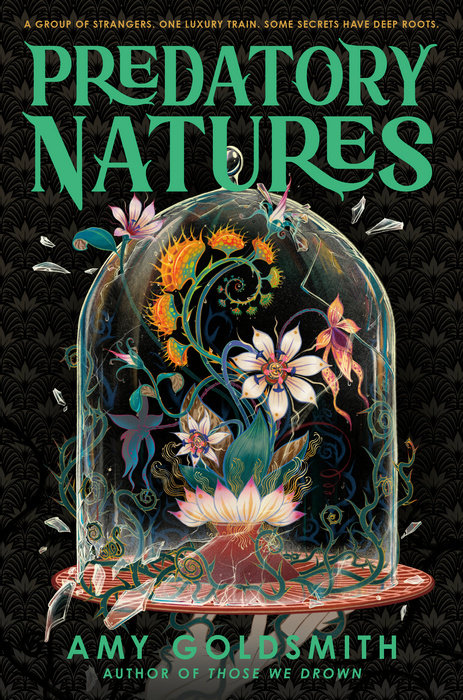Predatory Natures
Author Amy Goldsmith
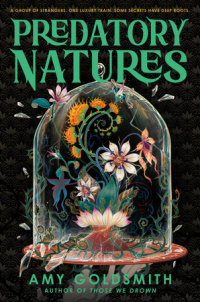
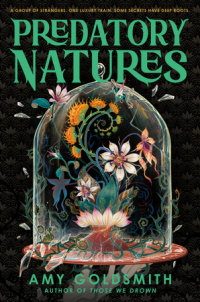
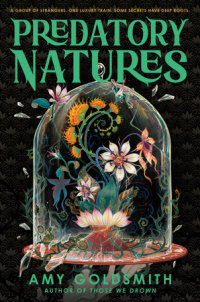
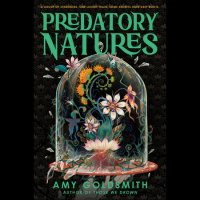
Predatory Natures
A teen girl's dream job aboard a luxury train derails when she discovers the strange cargo being transported—a mysterious and beautiful greenhouse—but its flowering façade may hide deadly thorns beneath, in this atmospheric and lush novel from the author of Those We Drown.
When Lara Williams gets a summer job aboard the luxury train the Banebury, she thinks she’s landed a five-star escape from her past. Even after she learns that her ex-friend Rhys, who she…
A teen girl's dream job aboard a luxury train derails when she discovers the strange cargo being transported—a mysterious and beautiful greenhouse—but its flowering façade may hide deadly thorns beneath, in this atmospheric and lush novel from the author of Those We Drown.
When Lara Williams gets a summer job aboard the luxury train the Banebury, she thinks she’s landed a five-star escape from her past. Even after she learns that her ex-friend Rhys, who she definitely did not have feelings for before their relationship imploded, is one of her coworkers, she’s determined to make things work.
But on the first day of their journey, the trip takes a strange turn. Two mysterious carriages filled with an array of beautiful and rare plants are attached to the Banebury in the middle of the night.
And with them comes a pair of siblings. Wealthy, mysterious, and charismatic, Gwen and Gwydion claim the plants they’re transporting are for research, but Lara can’t shake the feeling that there’s something . . . otherworldly about the strange blooms. Something that will stop at nothing to ensure the Banebury never reaches its destination.
Soon Lara will learn: You can’t outrun your troubles. You have to grab them by their roots. And if she can’t unearth the secrets of the Banebury, they might drag her down for good. . . .
An Excerpt fromPredatory Natures
1
An early spring breeze stirs the delicate buds on the trees as I gaze out over the ancient walled city of Carcassonne, deep in the south of France. Adjusting the vintage sunglasses I picked up in Milan last week, I take a final sip of my chocolat chaud before heading back to the bustling market where Vincent is waiting for me, all floppy French hair and--
“Attention all passengers. The Banebury will soon be arriving on platform thirteen.”
The announcement crashes into my dream. I flip my glossy magazine shut with a grin and shove it into my backpack. The article I was reading is titled “Secret Escapes”--which is fitting--and soon that will be me, lapping up the scenery as I make my way across Europe. My phone’s already bookmarked with historic sites I’m dy-ing to see and directions to all the best beaches. Clicking my phone to selfie mode, I force a smile and shake back my curls, appraising myself. I got this. Lara Williams, reinvented. Lara Born Anew. My fresh start (Lara’s Version). I’m friendly,…
1
An early spring breeze stirs the delicate buds on the trees as I gaze out over the ancient walled city of Carcassonne, deep in the south of France. Adjusting the vintage sunglasses I picked up in Milan last week, I take a final sip of my chocolat chaud before heading back to the bustling market where Vincent is waiting for me, all floppy French hair and--
“Attention all passengers. The Banebury will soon be arriving on platform thirteen.”
The announcement crashes into my dream. I flip my glossy magazine shut with a grin and shove it into my backpack. The article I was reading is titled “Secret Escapes”--which is fitting--and soon that will be me, lapping up the scenery as I make my way across Europe. My phone’s already bookmarked with historic sites I’m dy-ing to see and directions to all the best beaches. Clicking my phone to selfie mode, I force a smile and shake back my curls, appraising myself. I got this. Lara Williams, reinvented. Lara Born Anew. My fresh start (Lara’s Version). I’m friendly, professional . . . relaxed. If I say it enough times, who knows, maybe I’ll start be-lieving it. Picking up my Frappuccino, I tug my case toward the platform, weaving between hordes of distracted commuters.
I’m expecting the Banebury to be grand; after all, it’s five-star luxury accommodation. But though I’ve checked out the glossy photos on the website countless times, I audibly gasp as the train slides into Cardiff Central station. I mean, okay, I knew it wasn’t going to be anything like the crappy commuter train I used to take to school, all crazy ’80s prints on the seats and perfumed with stale piss, but this . . . this is an entirely different beast.
It glides effortlessly along the platform like some magnificent stallion, its sleek black paintwork glistening, its windowpanes glittering like diamonds in the February sun. And for a moment, I think I must have got it wrong, that this is an entire echelon above the train someone like me is due to work on, but no, there’s the name, painted on the side of the carriages in glorious golden, looping letters:
The Banebury
Through the windows, I spy plush crimson seating, acres of polished wood, and delicate crystal light fittings.
This is some fancy shit.
I’m early--I always am--wanting to scope out my surroundings and the people I’ll be working with in advance. As the train finally stills, I wait to see if anyone disembarks, but the doors remain stubbornly closed, with no sign of any passengers within. I hesitate outside the carriage nearest me, wondering if I should knock. But seconds later, there’s movement behind the window, and a tall, serious-looking woman with neat black braids opens the door. She squints down at me.
“Lara, yeah?” Her accent is pure South London. I smile, relaxing immediately--the image of the sneery old posh guy I’d pictured as my boss thankfully dissolving.
“Hey! Yeah, that’s me.”
“Recognize you from your photo. I’m Shoshanna. Well done for being early--good start.” She steps aside and, with a flourish of her white-gloved hand, gestures into the darkened interior of the carriage. “And welcome . . . to the Banebury.”
At her invitation, I climb on, clumsily hauling my suitcase behind me.
“Leave that here a minute,” she says, gesturing at my case, “while we wait for the others. I’ll give you a quick tour so you can orient yourself. Follow me.”
Together we step into what must be a dining carriage, the air expensively fragranced with a fresh floral scent. Roses, I think--my grandparents are big gardeners. My shoes sink deep into a plush carpet that is the color of ripe plums. What I notice first is how warm everything is, how welcoming. From the yellow-toned gold of the fixtures to the amber-colored wooden surfaces, all polished within an inch of their life, everything in this carriage glows with its own internal light. Ele-gant crystal glasses stand regimentally on mirrored shelves below fussy glass lamps that peer out from the walls like curious, long-necked swans. Upon a mag-nificent sideboard, inlaid with mother-of-pearl in checkerboard patterns, are several etched-silver champagne buckets. Velvet-padded seats in a vibrant peacock print sit politely beneath tables draped in white cloths, each bearing its own deli-cate little Tiffany-style lamp.
“Wow,” I say, my voice hushed with awe. I genuinely have no words. Shoshanna snorts. “I know, right?”
As she leads me through the train, the luxury seems to increase with each subsequent carriage. Through the dining room is a shimmering bar topped with milky, gold-veined marble, behind which is an expansive art deco mirror etched with candy-pink stained-glass feathers. Rose-gold stools topped with plump cushions in a playful shade of watermelon stand in a perfectly spaced arc about the bar.
“So this is the Dahlia Bar . . . and then through here . . . the Cedar Lounge.”
The lounge is a cozy but opulent space crammed with pillowy burgundy couches and low tables stacked with pricey-looking tomes on fashion and architecture. Arched windows framed in gold are accentuated with tapestry drapes, and the floor is a carpenter’s marvel: upon it, delicate polished stars interlink, each com-posed of three kinds of wood.
“Next, we’ve got the Azalea Coffee Lounge.”
Shoshanna’s meager words do not remotely do justice to this sumptuous homage to dark academia, complete with an antique, globe-style drinks trolley and artfully disheveled leather armchairs. A fully stocked coffee bar is discreetly hidden within carefully crafted bookshelves, each stuffed with leather-bound tomes imprisoned behind delicate gold filigree mesh, presumably to prevent them from flying off once the train starts moving. Gazing balefully down from the higher shelves are several slightly eerie, although well-kept, examples of taxidermy.
In sharp contrast, the following carriage is a sleek, airy viewing lounge in cool shades of cream, sage, and heather. Delicate settees and chaise longues face crystal-clear picture windows. In the next and final carriage, a lustrous black grand pi-ano dominates, surrounded by a scattering of chic golden tables and black-leather stools. A gold-etched sign decrees it the Orchid Lounge.
Shoshanna stops here and gestures about. “So . . . as you can see, we’ve got all the usual things you’d expect on a train like this--dining carriage, bar, couple of lounges . . . there’s an onboard chef, so you don’t have to worry about making meals or anything like that. As we make our way back through the train, I’ll show you the sleeper cars and the staff quarters, where you can dump your suitcase and get changed.”
At the other end of the train, past the communal areas, is a series of darker, narrower corridors carpeted in gold-flecked navy. On one side is a row of closed doors set into glossy dark wood, each bearing some ridiculously convoluted name engraved onto a brass plaque: the Amaryllis Suite, the Jacinda Suite, the Oleander Suite.
Shoshanna unlocks a door at random and gestures for me to look inside.
“Pretty swish, huh? You’d want it to be . . . for the price.”
It’s like peering into an intricate jewelry box. A bottle-green leather couch faces an enormous picture window, beside which is a low glass table bearing several crystal decanters in the shape of swans. Beyond that, half obscured by the swoop of an emerald-velvet drape, is a king-size bed that takes up the entire width of the room. Crisp white sheets peek out beneath an embroidered coverlet. For a moment, I’m outrageously jealous that people are allowed to travel like this.
“I’ll tell you how to make up the cabins once everyone’s here. For now, let me show you where you’ll be bunking.”
We pass through another carriage of passenger suites until Shoshanna unlocks a door leading to a more utilitarian-looking area. Here the space is much plainer, the walls a dirty off-white. As in the previous carriage, there is a row of closed doors to our left, although the gaps between them are noticeably narrower. Sho-shanna stops outside the first door, gray and unadorned. No brass plaques here.
“And this is you. You’re lucky, actually. Usually, staff have to bunk together, but as you already know, this is a limited journey--skeleton staff, fewer passengers than usual--until we get to Tallinn and pick up the regular staff and full-paying customers.”
Her words send cold reality crashing over me--a reminder that this was the only reason I managed to score such a good job. I applied for the opportunity the very first moment I heard about it last fall, along with some of my old school friends. Back then, it seemed like the perfect way to spend our first summer after graduation--working for the first few weeks but in luxury, then backpacking home across Europe.
Somewhat unsurprisingly, due to my complete lack of any relevant experience, my application was almost immediately rejected. Until a few weeks ago, that is, when, several dull months into an unexpected gap year, I was contacted by the company and offered a similar position on one of their off-season trains. Two weeks’ work for a pretty decent sum of money--enough to get me back home in style. I accepted mere seconds after opening the email. To quote my friend Casey: For once, the planets seemed to have aligned. After a long run of nothing but bad luck, here was the perfect opportunity to turn things around while I waited to re-sit my exams in May. It wasn’t as if I had much else to do, and I hoped that working would take my mind off the fact that my social life had recently dwindled to nothing, leaving me festering in my bedroom watching Supernatural reruns and consoling myself with the odd tub of ice cream.
Anyway, off-season actually sounds much more my speed than the original offer. From what I can gather, I’ll be strictly making up the numbers as the Banebury ambles across Europe to its official starting point, Tallinn, where the professional staff get on, along with all the millionaires. I’ll be leaving the train there and trav-eling back to Wales, hopefully catching some early spring sun on the way.
“Right, then, I’ll leave you to get sorted while I look out for the others,” Shoshanna says. Once I’ve retrieved my case, she hands me a neat stack of monochrome clothes and checks her watch. “Team meeting in the Cedar Lounge in about half an hour, okay?”
Opening the door, I shrug off my heavy backpack and scope out where I’ll be stay-ing for the next couple of weeks. There’s a narrow, metal-framed bunk bed that gives me prison vibes, a chipped fold-down table beneath a meager slit of a win-dow, and a slim built-in armchair. Opposite the bunk, a door leads to an imaginatively small bathroom containing a toilet and a mini sink. No shower--but I assume they’re shared--and at least I have my own toilet. Besides, anything is going to look disappointing after the opulence I’ve just walked through.
Heaving my suitcase onto the bottom bunk, I splash my already sweaty face with water, apply a quick slick of mascara, and pull my unruly blond curls into an approximation of a neat bun. Next, I get changed into the uniform Shoshanna handed me. It isn’t exactly something I’d choose to wear: a black knee-length pencil skirt (that, in all honesty, is probably a size too small) and a starchy-collared white blouse, all topped off with a fussy burgundy scarf that conveniently matches a lot of the train’s upholstery. A badge declaring my name is the finishing touch. Tucking a loose strand of hair behind my ear, I smile, close-lipped, into the mirror, barely recognizing the professional-looking person staring back at me.
“You got this,” I remind my reflection sternly.
A loud bang comes from the cabin beside mine--the sound of a door being flung open too exuberantly--and I jump. Attaching the old-fashioned set of keys Shoshanna gave me to my belt loop, I go to see what the noise is all about, narrowly avoiding walking directly into a tall, rangy figure with a tangle of dark hair shoved beneath a baseball cap. Immediately, I catch his eye, and time seems to slow.
“Oh,” I say, momentarily lost for words. “It’s you.”
2
“Well, that’s quite the welcome,” muses Rhys in his familiar singsong Welsh drawl. “Yeah, I’m doing good, Lara. Happy to be here, thanks for asking and all.”
I falter at the sight of him, finding myself unwillingly pulled into a whirlpool of complicated emotion.
“Sorry,” I murmur. “I’m just surprised to see you here, that’s all.”
Honestly, I shouldn’t be. After all, we initially applied for the position together. Rhys was the one who’d found the ad way back when we’d all been planning out our summer with giddy excitement. In the before-times, when we were still friends gazing out at that glorious stretch of freedom together before heading off to university and whatever awaited us beyond.
Of course, it had crossed my mind when I accepted the job that Rhys might well have been offered this second opportunity, too. I knew that like me, he’d ended up taking a gap year. Not because he was retaking exams, like I was--Rhys would never--but to save some money before he took up his deferred place at Cambridge. Still, just the sight of him dredges up a tangled skein of feelings that I hadn’t wanted to examine too closely unless I was forced to. Wariness, uncertainty . . . and even hope.
“Guess you got the email, too?” he asks. “I was going to call and ask you, actually, but . . . uh, yeah.”
To my relief, he leaves it there.
He’s like a stranger before me, despite the fact that up until recently, we were close friends, and had been for over a year. I don’t know where to look or what to do with my face as he stands there expectantly, waiting for some kind of response.
As the seconds tick by, my neck slowly heats. I know I should have called him the moment I got the job--before that even--but every time I tried, the words I wanted to say became an unknown language, impossible to speak.
Get it together, Lara. Just act normal.
I clear my throat.
“Yeah--yeah, I got the email. I mean, this opportunity is too good to miss, right?”
Adventure . . . distraction. But more than that, escape. That’s what I’m here for. Well, it’ll be harder to escape now that there’s a permanent reminder of my re-cent past chilling in the next cabin.
He nods at my outfit.
“I barely recognized you, to be honest; it’s been so long. Still, I’ve got to say, the air-hostess vibe kind of suits you.”
Unsurprisingly, there’s a tinge of resentment in his tone. I chew my lip. I can’t exactly blame him for it.
